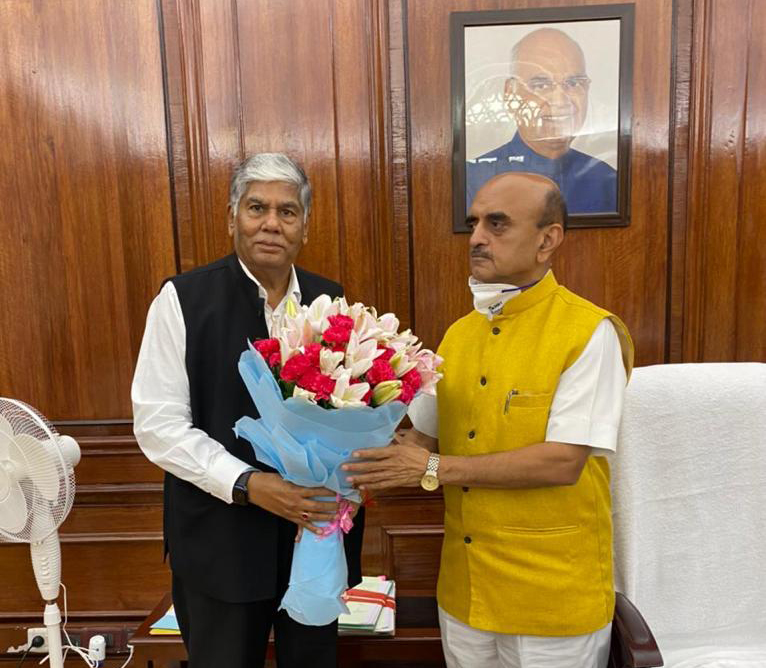MSMEs are close to my heart and they are vital for nation building, says Dr. Karad
“Micro, small and medium enterprises (MSME) sector is close to my heart and it is the lifeline of the Indian economy. This sector is vital for the nation building. We can fulfill
Hon’ble Prime Minister’s vision of USD 5 trillion economy only if we strengthen the vibrancy of the MSME ecosystem. More than 95% of enterprises in India are MSMEs and they
contribute 30% to GDP and 48% to exports. Most importantly, this sector provide employment to more than 110 million people, making it the largest source of employment after
agriculture,” said Dr. Bhagwat Karad, Hon’ble Minister of State for Finance, Government of India while delivering the Keynote Address at a webinar organized by MVIRDC World
Trade Center Mumbai. The webinar was organized to release the MVIRDC Research Study on “Enhancing MSME Competitiveness through Digital Modes of Financing”.
Dr. Karad raised concern about the poor uptake of the electronic invoice discounting platform TReDS by public sector undertakings (PSUs). TReDS is an electronic platform for
facilitating the financing or discounting of trade receivables of Micro, Small and Medium Enterprises (MSMEs) through multiple financiers. The minister remarked, “It is a cause
of concern that the share of invoices issued by public sector undertakings is hardly 4-5% in the total invoices discounted at all the three TReDS platforms in the country.
I invite MVIRDC WTC Mumbai and the industry to submit a detailed representation on these issues so that we can discuss this with concerned government department and address them.”
The Minister also pointed out that his government will organize meeting with banks to improve the credit deposit (CD) ratio in the banking system, which has fallen from as high as 77% in 2013 to 71% as of 2022.
Speaking about the benefit of fintech industry for MSMEs, Hon’ble Minister pointed out, “Our Hon’ble PM while addressing the Inauguration at InFinity Forum said, “Finance is the life blood of an economy and technology
is its carrier. Both are equally important for achieving “Antodaya and Sarvodaya”. Fintech industry in India is innovating to enhance access to finance and the formal credit system to MSMEs. Now it is time to convert
these Fintech initiatives into a Fintech Revolution. I firmly believe that Fintech can act as a catalyst in the growth of MSMEs as Technology holds no bias, and so small businesses can benefit from
technological advancements as much as the big names in the industry. The aforesaid initiatives have been thoroughly and comprehensively evaluated by
The MVIRDC Research Study on digital finance.”
Sharing the latest loan disbursal data on the government’s PSB 59-minute loan portal, the minister informed that till date approximate 2 lakh number of loans amounting to Rs. 58,044 crore have been disbursed
through this portal.
Speaking on this occasion, Mr. Sundeep Mohindru, Chief Executive Officer, M1xchange suggested Insurance Regulatory and Development Authority (IRDA) to implement the guidelines on trade credit insurance for
invoice financing under the TReDS platform. He also suggested creation of a ‘Second Window’ for integration of TReDS platform with GSTN e-invoicing portal, so that MSME vendors can get finance against their
receivables based on their goodwill.
Mr. Kailashkumar Varodia, Chief Financial Officer, Receivables Exchange of India Ltd. sought the support of the central and state governments for onboarding public sector undertakings (PSUs) in the TReDS platform.
In his remarks, Mr. Hrushikesh Mehta, Chief Evangelist – CredAll, Volunteer – iSPIRT suggested all the state governments to provide credit guarantee and interest subsidy for loans disbursed digitally under the Open Credit
Enablement Network (OCEN). OCEN is a set of software protocol, developed by iSPIRT, to democratize the lending business by enabling any business entity, on which millions of entrepreneurs transact,
to become a loan service provider (LSP). The LSP integrates multiple lenders to provide completely digital loans.
Earlier in his welcome remarks, Dr. Vijay Kalantri, Chairman, MVIRDC World Trade Center Mumbai pointed out, “MSMEs are the cornerstone of Indian economy and it is a matter of great concern that only
16% of the credit raised by MSMEs is through formal sources. I was part of various committees appointed by RBI and Government of India in the past to recommend policy measures to promote credit
to MSMEs. Even though the default rate is lower in case of MSME loans, compared to large companies, small enterprises have genuine difficulty in accessing bank credit. The share of MSME credit
in total priority sector lending of banks has declined from 16% in the past to 8.3% now.”
Suggesting policy measures to address the credit gap in the MSME sector, Dr. Kalantri mentioned, “Government may consider converting SIDBI into a full fledged commercial bank for direct lending to MSMEs.
Also, large companies may be asked to disclose their outstanding dues to MSME vendors on their balance sheet to ensure timely settlement of invoices. State governments may also revive State Finance Corporations
(SFCs), many of which have become dysfunctional due to lack of funding.”
Dr. Kalantri emphasized that true economic recovery from the COVID crisis can be achieved only with the turnaround of the MSME sector. “We need more policy support to improve flow of credit to MSMEs. When home
loan is available at as low as 6-7% interest rate in 3-4 days, we need to ensure that our MSMEs also have timely access to credit at affordable interest cost.”
The MVIRDC Research study, which was released on this occasion, highlights the need for a digital push to bridge the unmet credit needs of India’s MSMEs. Some of the suggestions of the study are: encouraging reverse
factoring, revising capital adequacy norms for banks’ exposure to invoice financing under TReDS platform, increasing the permissible credit limit that can be disbursed based on Aadhar eKYC and
increasing eMandate limit under UPI to enable seamless loan collection.

Chairman, MVIRDC World Trade Center Mumbai

 : +91 7718886506
: +91 7718886506